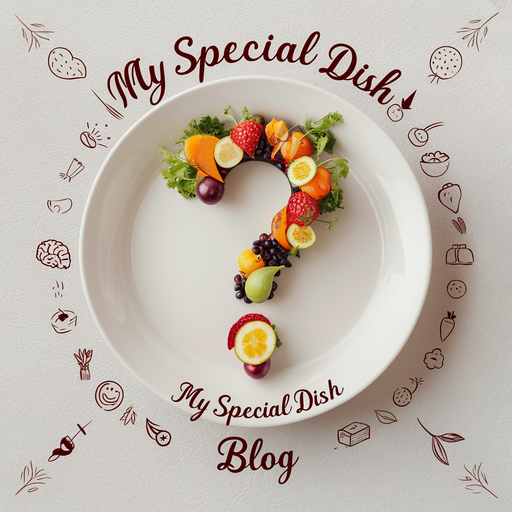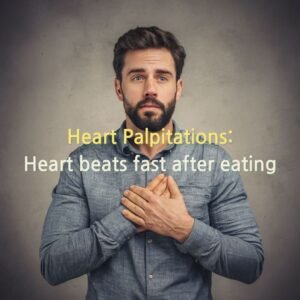– ENGLISH –
Heart Palpitations: Heart beats fast after eating:
Why Do You Get Heart Palpitations After Eating?
You may wonder why your heart beats fast after eating.
Heart palpitations after eating can be an alarming experience.
Let’s dive into why this happens and how to address it.
Heart Palpitations: Heart beats fast after eating:
What Are Palpitations?
Heart palpitations are irregular heartbeats.
They can manifest as skipped beats or extra beats, such as premature ventricular contractions (PVCs) or premature atrial contractions (PACs).
These are abnormal beats that create a sensation in the chest, often described as a flip-flop feeling.
Heart Palpitations: Heart beats fast after eating:
When Should I Worry About Heart Palpitations?
While occasional palpitations can be normal, there are times when they may indicate a more serious condition.
If palpitations last longer than a few seconds or are associated with other symptoms such as dizziness, fainting, shortness of breath, or chest pain, seek medical attention.
These symptoms may suggest underlying medical concerns that require professional evaluation.
Heart Palpitations: Heart beats fast after eating:
How Many Heart Palpitations Are Too Many?
Frequent palpitations can be a cause for concern.
If you experience more than six palpitations per minute or in groups of three or more, it may be time to consult a doctor.
Additionally, if your pulse is higher than 100 beats per minute without other causes like exercise or fever, or if you have risk factors for heart disease (such as high cholesterol, high blood pressure, or diabetes), you should seek medical advice.
Heart Palpitations: Heart beats fast after eating:
The Role of the Cardiac Pacemaker
The heart’s rhythm is maintained by a group of cells known as the cardiac pacemaker.
These cells generate rhythmic electrical impulses that cause the heart to contract and pump blood throughout the body.
An average resting heart rate is about 70 beats per minute.
Electrolytes like potassium, sodium, magnesium, chloride, and calcium play a crucial role in maintaining this rhythm.
Heart Palpitations: Heart beats fast after eating:
Causes of Palpitations
Heart palpitations can be a precursor to more serious conditions like atrial fibrillation.
Here are some common causes:
Digestive Issues
Many people experience palpitations linked to digestive problems such as heartburn, acid reflux, GERD, and gallbladder issues.
The connection isn’t entirely clear, but it’s believed that pressure within the bile ducts and surrounding tissues can affect the heart, leading to palpitations.
Low Potassium
Potassium is vital for controlling the heart’s pacemaker. Low potassium levels can increase the risk of palpitations and more serious conditions like atrial fibrillation.
What Foods Cause Palpitations?
Certain foods can trigger heart palpitations in some individuals.
Heavy meals rich in carbohydrates, sugar, or fat can lead to palpitations.
Additionally, foods containing high levels of monosodium glutamate (MSG), nitrates, or sodium can also cause irregular heartbeats.
If you notice palpitations after eating specific foods, it might be due to food sensitivity.
Heart Palpitations: Heart beats fast after eating:
Understanding pH Levels
Your body’s pH level can also influence heart palpitations. If your blood becomes too alkaline (above 7.45), it can disrupt the movement of potassium through the body and the heart.
Other Causes
Other factors contributing to palpitations include excessive caffeine, alcohol, and hyperthyroidism.
However, the more common causes are digestive issues and low potassium levels.
Heart Palpitations: Heart beats fast after eating:
Solutions for Heart Palpitations
Addressing Digestive Problems
If you suffer from digestive issues, consider trying intermittent fasting to give your digestive system a break. Avoid refined carbohydrates and vegetable oils, which can stress the gallbladder and stomach. Adopting a healthy keto diet and including apple cider vinegar can help improve digestion and reduce palpitations.
Balancing Potassium Levels
Ensuring adequate potassium intake is crucial.
If you’re on a diuretic for high blood pressure, it might deplete your potassium levels.
Low vitamin D and high insulin levels can also cause potassium deficiency.
Increase your vegetable intake to 7-10 cups daily or consider using an electrolyte powder to meet your potassium needs.
Heart Palpitations: Heart beats fast after eating
Home Remedies to Relieve Heart Palpitations
Our goal is your satisfaction.
Let us show you the way with these home remedies to relieve heart palpitations:
- Perform Relaxation Techniques: Practices such as meditation, deep breathing, and yoga can help reduce stress and anxiety, which often trigger palpitations.
- Reduce or Eliminate Stimulant Intake: Cut back on caffeine, nicotine, and other stimulants that can provoke irregular heartbeats.
- Stimulate the Vagus Nerve: Techniques like coughing, bearing down as if having a bowel movement, or chanting “ohm” can help regulate your heartbeat.
- Keep Electrolytes Balanced: Ensure you are getting enough potassium, magnesium, and other electrolytes, which are essential for heart health.
- Stay Hydrated: Drink plenty of water to maintain good cardiovascular function.
- Avoid Excessive Alcohol Use: Limit alcohol consumption to prevent dehydration and heart strain.
- Exercise Regularly: Physical activity can strengthen your heart and improve overall cardiovascular health.
Heart Palpitations: Heart beats fast after eating
How Can I Stop Palpitations Immediately?
If you need to stop palpitations quickly, try these methods:
- Perform Vagal Maneuvers: Actions such as taking a cold shower, splashing cold water on your face, or applying a cold towel or ice pack to your face for 20 to 30 seconds can help. The sudden impact of cold water activates the vagus nerve.
- Chant, Cough, or Gag: Chanting the word “ohm,” coughing, or gagging can also help regulate your heartbeat.
- Hold Your Breath or Bear Down: Taking a deep breath and holding it or bearing down as if having a bowel movement can stimulate the vagus nerve and help control palpitations.
Heart Palpitations: Heart beats fast after eating
How Do You Calm Heart Palpitations?
To calm heart palpitations:
- Breathe Deeply: Deep breathing helps you relax and can alleviate palpitations.
- Splash Your Face with Cold Water: This action stimulates the vagus nerve, which controls your heart rate.
- Don’t Panic: Stress and anxiety can exacerbate palpitations, so it’s important to stay calm and composed.
Heart Palpitations: Heart beats fast after eating
Conclusion
These strategies can help manage and reduce heart palpitations, promoting better heart health and overall well-being.
Understanding and addressing the causes of heart palpitations can help you manage and reduce these episodes.
By improving your diet and ensuring proper electrolyte balance, you can support your heart health and overall well-being.
– 한국어 –
왜 식사 후 심장이 두근거리나요?
식사 후에 심장이 빠르게 뛰는 이유가 궁금할 수 있습니다.
식사 후 심장이 두근거리는 것은 당황스러운 경험일 수 있습니다.
이 현상이 왜 발생하는지, 그리고 어떻게 해결할 수 있는지 알아보겠습니다.
심장이 두근거린다는 것은 무엇인가요?
심장 두근거림은 불규칙한 심장 박동을 말합니다.
이것은 건너뛰는 박동이나 추가적인 박동(PVCs 또는 PACs)으로 나타날 수 있습니다.
이는 가슴에서 뒤집히는 듯한 느낌으로 종종 묘사되는 비정상적인 박동입니다.
심장 두근거림에 대해 언제 걱정해야 하나요?
가끔 발생하는 두근거림은 정상일 수 있지만, 때로는 더 심각한 상태를 나타낼 수 있습니다.
두근거림이 몇 초 이상 지속되거나 어지러움, 실신, 호흡 곤란 또는 흉통과 같은 다른 증상이 동반되는 경우 의료 도움을 받아야 합니다.
이러한 증상은 전문가의 평가가 필요한 근본적인 의학적 문제를 시사할 수 있습니다.
얼마나 많은 심장 두근거림이 문제인가요?
빈번한 두근거림은 걱정의 원인이 될 수 있습니다.
분당 6회 이상 또는 3회 이상의 그룹으로 두근거림이 발생하면 의사와 상담해야 합니다.
또한 운동이나 열이 아닌 다른 원인 없이 맥박이 분당 100회 이상인 경우, 또는 고지혈증, 고혈압, 당뇨병과 같은 심장 질환의 위험 요인이 있는 경우 의사의 조언을 구해야 합니다.
심장 박동을 유지하는 심박동기 역할
심장의 리듬은 심장 박동기라고 알려진 세포 그룹에 의해 유지됩니다.
이 세포들은 심장이 수축하여 혈액을 몸 전체로 펌핑하게 하는 리드미컬한 전기 충동을 생성합니다.
평균 휴식 시 심박수는 약 분당 70회입니다.
칼륨, 나트륨, 마그네슘, 염화물, 칼슘과 같은 전해질은 이 리듬을 유지하는 데 중요한 역할을 합니다.
두근거림의 원인
심장 두근거림은 심방세동과 같은 더 심각한 상태의 전조가 될 수 있습니다.
다음은 몇 가지 일반적인 원인입니다:
소화 문제
많은 사람들이 속쓰림, 산 역류, GERD, 담낭 문제와 같은 소화 문제와 관련된 두근거림을 경험합니다.
연결 고리가 완전히 명확하지는 않지만, 담관 및 주변 조직 내의 압력이 심장에 영향을 미쳐 두근거림을 유발할 수 있다고 믿어집니다.
칼륨 부족
칼륨은 심장 박동기를 제어하는 데 필수적입니다. 칼륨 수치가 낮으면 두근거림 및 심방세동과 같은 더 심각한 상태의 위험이 증가할 수 있습니다.
심장 두근거림을 유발하는 음식은 무엇인가요?
일부 음식은 특정 개인에게 심장 두근거림을 유발할 수 있습니다.
탄수화물, 설탕 또는 지방이 풍부한 식사 후 두근거림이 발생할 수 있습니다.
또한, 고농도의 MSG, 아질산염 또는 나트륨이 함유된 음식을 섭취하면 불규칙한 심장 박동을 유발할 수 있습니다.
특정 음식을 섭취한 후 두근거림이 발생한다면 음식 민감성 때문일 수 있습니다.
pH 수준 이해하기
신체의 pH 수준도 심장 두근거림에 영향을 미칠 수 있습니다. 혈액이 너무 알칼리성(7.45 이상)이 되면 칼륨의 이동을 방해하여 심장에 영향을 미칠 수 있습니다.
다른 원인들
과도한 카페인, 알코올, 갑상선 기능 항진증도 두근거림에 기여할 수 있습니다.
그러나 더 일반적인 원인은 소화 문제와 칼륨 부족입니다.
심장 두근거림을 위한 해결책
소화 문제 해결하기
소화 문제로 고통받는 경우 간헐적 단식을 시도하여 소화 시스템에 휴식을 주는 것을 고려해보세요. 담낭과 위를 스트레스 줄 수 있는 정제된 탄수화물과 식물성 기름을 피하세요. 건강한 케토 식단을 채택하고 사과식초를 포함하면 소화를 개선하고 두근거림을 줄이는 데 도움이 될 수 있습니다.
칼륨 수치 균형 맞추기
충분한 칼륨 섭취를 보장하는 것이 중요합니다.
고혈압 약물로 이뇨제를 복용하고 있다면 칼륨 수치가 감소할 수 있습니다.
비타민 D가 낮거나 인슐린 수치가 높아도 칼륨 결핍을 유발할 수 있습니다.
채소 섭취를 하루 7-10컵으로 늘리거나 전해질 파우더를 사용하여 칼륨 요구량을 충족하세요.
심장 두근거림을 완화하는 가정 요법
우리의 목표는 여러분의 만족입니다.
심장 두근거림을 완화하기 위한 가정 요법은 다음과 같습니다:
- 이완 기술 수행: 명상, 깊은 호흡, 요가와 같은 연습은 스트레스와 불안을 줄이는 데 도움이 됩니다.
- 자극제 섭취 줄이기 또는 제거: 카페인, 니코틴 및 기타 자극제를 줄이거나 없애면 불규칙한 심장 박동을 예방할 수 있습니다.
- 미주 신경 자극: 기침, 배변 시 힘주기, “옴” 소리 내기와 같은 기술은 심박수를 조절하는 데 도움이 됩니다.
- 전해질 균형 유지: 칼륨, 마그네슘 및 기타 전해질을 충분히 섭취하는 것이 중요합니다.
- 수분 유지: 충분한 물을 마셔서 좋은 심혈관 기능을 유지하세요.
- 과도한 알코올 사용 피하기: 알코올 소비를 제한하여 탈수 및 심장 스트레스를 예방하세요.
- 규칙적인 운동: 신체 활동은 심장을 강화하고 전체적인 심혈관 건강을 개선할 수 있습니다.
심장 두근거림을 즉시 멈추는 방법
두근거림을 빠르게 멈추려면 다음 방법을 시도해보세요:
- 미주 신경 자극 수행: 찬물 샤워를 하거나 얼굴에 찬물 뿌리기, 얼굴에 차가운 수건이나 얼음팩을 20-30초 동안 대면 도움이 됩니다. 찬물의 충격이 미주 신경을 자극합니다.
- 노래, 기침, 구토 유발: “옴” 소리를 내거나 기침, 구토 유발은 심박수를 조절하는 데 도움이 될 수 있습니다.
- 숨을 참거나 힘주기: 깊게 숨을 들이마시고 참거나 배변 시 힘주기와 같은 동작은 미주 신경을 자극하여 두근거림을 조절할 수 있습니다.
심장 두근거림을 진정시키는 방법
심장 두근거림을 진정시키려면:
- 깊게 호흡하기: 깊은 호흡은 긴장을 풀어주고 두근거림을 완화하는 데 도움이 됩니다.
- 얼굴에 찬물 뿌리기: 이 동작은 심박수를 조절하는 미주 신경을 자극합니다.
- 당황하지 않기: 스트레스와 불안은 두근거림을 악화시킬 수 있으므로 침착하고 차분하게 유지하는 것이 중요합니다.
결론
이러한 전략은 심장 두근거림을 관리하고 줄이는 데 도움이 되어 더 나은 심장 건강과 전반적인 웰빙을 촉진할 수 있습니다.
심장 두근거림의 원인을 이해하고 해결하는 것은 이러한 에피소드를 관리하고 줄이는 데 도움이 됩니다.
식단을 개선하고 적절한 전해질 균형을 유지함으로써 심장 건강과 전반적인 웰빙을 지원할 수 있습니다.

